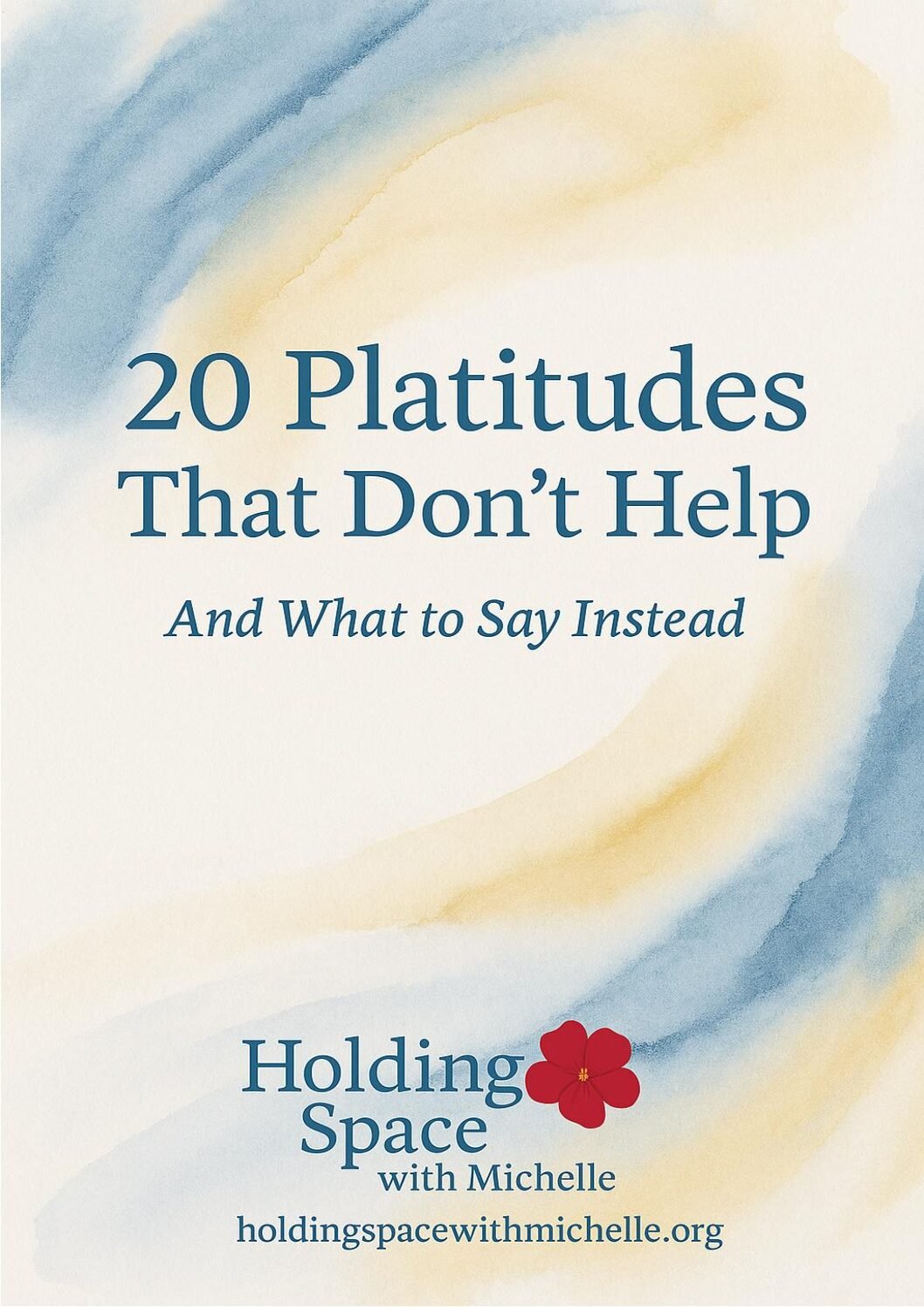

Before You Begin
This guide is not a substitute for medical, psychological, or crisis care.
If you or someone you love is in immediate danger, call 911.
For mental health support, text HOME to 741741 for the Crisis Text Line.
Grief is personal, non-linear, and complicated. Caregivers need care too.
And if you’re experiencing anticipatory grief — that doesn’t make later loss easier.
“Everything happens for a reason.”
Maybe. But that doesn’t mean it had to happen this way. Or that it’s your job to be okay with it.
Sometimes we find meaning after, not during. Not right now.
Try saying: “I’m so sorry this happened. I’m here for you.”
“They’re in a better place.”
That may bring comfort to some. But it’s okay if you just want them here.
Try saying: “I wish they were still here with you. I know how much you loved them.”
“At least they lived a long life.”
So? You loved them your whole life. Long doesn’t mean easy. Or less painful. This still hurts.
Try saying: “A lifetime together still isn’t enough. I’m so sorry.”
“You’re so strong.”
Strength isn’t the absence of pain. It’s surviving the pain. Waking up and facing the day when
you’d rather not — that’s strong.
Try saying: “You don’t have to be strong with me. I’m here, however you are.”
“Let me know if you need anything.”
Well-meaning, perhaps, but it can seem insincere. Grievers rarely know what they need —
and if they do, they may not have the energy to ask.
Try saying: “Would it help if I took care of [specific thing]? If not, I can just sit with you.”
“They wouldn’t want you to be sad.”
Maybe not. But they’d understand. Sadness is part of love. And love doesn’t end when
someone dies.
Try saying: “Of course you’re sad. You loved them. I’m here for all of it.”
“Everything will be okay.”
No, life without them will never be the same. You might learn to carry it. You might smile
again. But it won’t go back to okay. And that’s not failure. That’s grief.
Try saying: “This isn’t okay. But you don’t have to go through it alone.”
“You have to be strong for your kids / your mom / everyone else.”
Actually, you don’t. You just have to be human. And humans break down sometimes. That’s
not weakness. That’s truth.
Try saying: “You don’t have to hold it together for anyone. You get to fall apart.”
“Time heals all wounds.”
Time helps. But it’s not a cure. Some wounds close slowly. Some leave scars. Healing isn’t
forgetting — it’s learning how to live with the ache.
Try saying: “Take all the time you need. I’ll be here as long as it takes.”
“God never gives you more than you can handle.”
Then God must be wildly overestimating me. Grief isn’t a test. It’s a reckoning. You don’t have
to feel grateful for the lesson while you’re still bleeding.
Try saying: If they’re religious, “I’m keeping you in my prayers.” If not — or if you’re not sure —
“This is too much, and I’m here with you in it.”
“They’re always with you.”
Oh, yeah? Prove it. They’re not here for coffee. Or birthdays. Or this godawful Tuesday. And
sometimes, that absence is louder than any presence.
Try saying: “I know you miss them. Is there a way you still feel close to them? I’d love to hear.”
“At least they’re not suffering anymore.”
That might be true. But now you are. Compassion for them doesn’t cancel out the pain you’re
in.
Try saying: “Their suffering is over, but yours isn’t — and that matters too.”
“Stay busy.”
Distraction isn’t healing. You can’t outrun grief. And honestly? A little wall-staring might be
exactly what your soul needs.
Try saying: “However you’re coping is okay. If resting helps, rest. If doing helps, do. There’s
no one right way.”
“Don’t cry — they wouldn’t want that.”
You’re allowed to cry. You’re allowed to not cry. Tears aren’t a failure — they’re a release.
Try saying: “Cry if you need to. Or don’t. However it comes out, it’s okay.”
“You should be over it by now.”
Tell them to drop dead. (Kidding. Mostly.) Grief has no deadline. It comes in waves — and
some waves don’t care what the calendar says.
Try saying: “There’s no ‘over it.’ There’s just living with it. However long it takes, you’re
allowed.”
“It was God’s plan.”
That may be your belief — and it might be a comfort to you. But timing your theology for
someone else’s pain? Risky move.
Try saying: I don’t have the right words. But I’m so sorry this happened.
“Try to focus on the good times.”
You will — eventually. But don’t rush it. Good memories can sting when the wound is fresh.
Try saying: “I’d love to hear a story about them — if you feel like sharing.”
“At least you got to say goodbye.”
Yes. And it still hurts like hell. Saying goodbye doesn’t soften the silence that follows.
Try saying: “Even with a goodbye, this is still such a heavy loss. I’m so sorry.”
“Everything happens for a reason.” (yes, again)
Let’s say that’s true. It still doesn’t mean this was fair, kind, or deserved.
Try saying: “This wasn’t fair. And I won’t pretend it was. I’m with you.”
“They wouldn’t want you to grieve like this.”
Grief isn’t a performance. You don’t owe anyone a polished version of your pain — not even
the person you lost.
Try saying: “However you’re grieving is okay. You don’t have to hold it in for anyone.”
